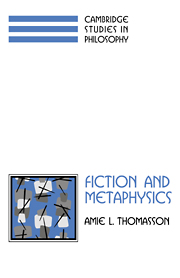Book contents
- Frontmatter
- Contents
- Acknowledgments
- Introduction: From Fiction Into Metaphysics
- Part One The Artifactual Theory of Fiction
- Foreword
- 1 If we postulated fictional objects, what would they be?
- 2 The nature and varieties of existential dependence
- 3 Fictional characters as abstract artifacts
- 4 Reference to fictional characters
- 5 Identity conditions for fictional characters
- Part Two Ontological decisions
- Notes
- Bibliography
- Index
2 - The nature and varieties of existential dependence
Published online by Cambridge University Press: 23 September 2009
- Frontmatter
- Contents
- Acknowledgments
- Introduction: From Fiction Into Metaphysics
- Part One The Artifactual Theory of Fiction
- Foreword
- 1 If we postulated fictional objects, what would they be?
- 2 The nature and varieties of existential dependence
- 3 Fictional characters as abstract artifacts
- 4 Reference to fictional characters
- 5 Identity conditions for fictional characters
- Part Two Ontological decisions
- Notes
- Bibliography
- Index
Summary
I have argued that fictional characters are dependent objects, requiring for their very existence such entities as literary works and the creative acts of an author. But they depend on these in different ways – requiring the creative acts of an author only to come into existence, and works of literature to remain in existence – so that it is misleading to simply speak of these indifferently as dependencies. To unravel the details of the status of fictional objects we must step back to examine the concept of existential dependence in general and to delineate carefully the various forms that this relation can take.
One should not be misled, however, into thinking that only those tracking fictional objects and other ontological oddities need to worry about dependence. Dependence is an extraordinarily common and varied phenomenon. Clear notions of dependence are important to understanding the status not only of fictional objects but also of cultural and institutional entities and certain biological, physical, and even abstract objects. Thus, showing what notions of dependence underlie this view of fictional characters reemphasizes the fact that fictional objects are to be understood along the same lines as many, perhaps most, other entities in the everyday world. At the same time, developing the tools needed to understand fictional objects provides the tools to analyze the structure of a great variety of entities of other sorts.
Before we can use dependence to explicate the ontological status of fictional characters and other objects, we need a theory of dependence at once general enough to cover all of the cases, revealing what they have in common, and fine-grained enough to respect important differences in types of dependence.
- Type
- Chapter
- Information
- Fiction and Metaphysics , pp. 24 - 34Publisher: Cambridge University PressPrint publication year: 1998

